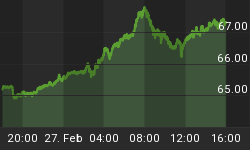Part 3 in a 6 Part Video Series on Quantitative Easing
A Wall Street Journal article (10/27/10) on quantitative easing (QE) hints the Fed will take a middle of the road approach in terms of the size and duration of QE2. As we would expect, the stock and commodity markets' initial reaction is negative. A middle of the road approach to QE seems counter intuitive to the Fed's own historical analysis of why quantitative easing was ineffective in Japan. In CCM's July 2010 review of James Bullard's Seven Faces of "The Peril", our read between the lines interpretation of Bullard's take on QE included:
In order for quantitative easing to sufficiently increase future inflation expectations, market participants must believe the Fed will do "whatever it takes for as long as necessary" to obtain the objective of sufficiently positive inflation. This means the Fed must be willing to leave balance sheet expansion in place for as long as necessary to create expectations of higher future inflation by market participants (consumers, investors, companies, etc.). This reminds us of past "bazooka-like" policy moves, where policymakers would say, "You think we can't create positive inflation? Just watch."
The key to next week's Fed statement on QE will be how they address the concept of "whatever it takes for as long as necessary". We can use gold and the U.S. dollar to monitor the market's reaction to QE2. On October 11th in U.S. Dollar Could Rally In Coming Weeks, we hypothesized QE2 could be a "buy the rumor, sell the news event" relative to risk assets. Since October 11th, the dollar index has moved from 77.18 as high as 78.36; a move above 78.36 would increase the odds of the U.S. dollar having a multi-week countertrend rally. On October 13th with the S&P trading at 1,169, we listed 1,196 as a possible short-term upside target. The S&P 500's intraday high on October 25th was 1,196, which means we have entered a zone where the odds of a short-to-intermediate-term reversal have increased (emphasis on odds). Stock market breadth on October 26th was weak, adding to the list of concerns over the next few days. We recently mentioned some yellow flags in the gold market. Thus far, gold is holding up well enough that a push to new highs still could be in the cards. From a short-term bearish perspective, a break of the thin blue trendline below would increase our concerns about a correction in gold. The long-term fundamentals for gold remain sound.

What is quantitative easing? - Video: In part three of our six part series on quantitative easing, we examine Fed statements, writings, and publications related to the objectives of, and rationale behind, QE2. The analysis of some key Fed commentary on quantitative easing allows us to better understand the Fed's perspective relative to QE's possible impact on the financial markets, investing, the economy, interest rates, asset prices, and the wealth effect. Today's quantitative easing video also touches on the following:
- Duration of QE program
- Consumption
- Investment
- Ben Bernanke's "printing press" speech
- U.S. dollar devaluation
- Fiat / paper money system
- Spending
- Inflation
- Dividend-paying securities (video player below)


Above is Part 3 in the QE series; previous QE videos:















